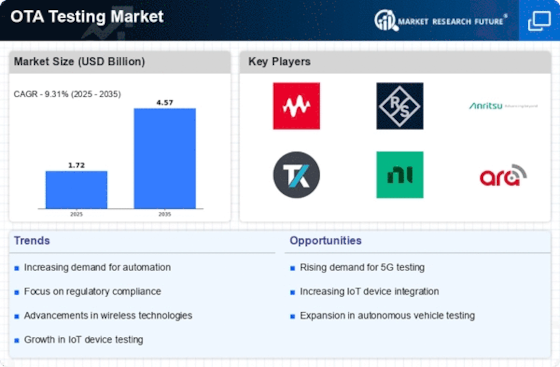Emergence of 5G Technology
The rollout of 5G technology is significantly influencing the OTA Testing Market. With its promise of enhanced speed, lower latency, and increased capacity, 5G is set to revolutionize wireless communication. As telecommunications companies invest heavily in 5G infrastructure, the demand for OTA testing services is expected to rise. The OTA Testing Market must adapt to the unique challenges posed by 5G, including the need for testing at higher frequencies and ensuring compatibility with existing technologies. This transition is likely to create new opportunities for testing service providers, as they develop innovative solutions to meet the requirements of 5G-enabled devices. The anticipated growth in 5G adoption indicates a robust future for the OTA Testing Market, as it plays a crucial role in ensuring the performance and reliability of next-generation wireless devices.
Rising Adoption of IoT Devices
The proliferation of Internet of Things (IoT) devices is a key driver for the OTA Testing Market. As more devices become interconnected, the need for reliable wireless communication increases. This trend is evidenced by the estimated growth of IoT connections, which is projected to reach over 30 billion by 2025. Consequently, manufacturers are compelled to ensure that their devices meet stringent performance standards, leading to a heightened demand for OTA testing services. The OTA Testing Market is thus positioned to benefit from this surge, as it provides essential testing solutions to validate the performance and reliability of these devices in real-world scenarios. This growing reliance on IoT technology suggests that the OTA Testing Market will continue to expand in response to the evolving landscape of connected devices.
Regulatory Compliance Requirements
Regulatory compliance is a critical driver for the OTA Testing Market. As governments and regulatory bodies establish stringent guidelines for wireless devices, manufacturers are compelled to adhere to these standards to ensure market access. The OTA Testing Market plays a vital role in helping companies navigate these complex regulations, providing the necessary testing services to demonstrate compliance. This need for regulatory adherence is particularly pronounced in sectors such as automotive and healthcare, where safety and reliability are paramount. The increasing complexity of regulations suggests that the OTA Testing Market will continue to grow, as manufacturers seek expert guidance and testing solutions to meet compliance requirements. This trend underscores the importance of OTA testing in facilitating the successful launch of wireless devices in a highly regulated environment.
Increased Focus on Quality Assurance
Quality assurance has become a paramount concern for manufacturers in the OTA Testing Market. As competition intensifies, companies are increasingly prioritizing the reliability and performance of their wireless devices. This trend is reflected in the growing investment in testing services, with the OTA Testing Market witnessing a surge in demand for comprehensive testing solutions. Manufacturers recognize that thorough testing is essential to avoid costly recalls and maintain customer satisfaction. The OTA Testing Market is thus experiencing a shift towards more rigorous testing protocols, ensuring that devices meet the highest standards before reaching consumers. This emphasis on quality assurance is likely to drive further growth in the OTA Testing Market, as companies seek to differentiate themselves through superior product performance.
Technological Advancements in Testing Solutions
Technological advancements are reshaping the OTA Testing Market, driving innovation in testing methodologies and tools. The integration of automation and artificial intelligence into testing processes is enhancing efficiency and accuracy, allowing for faster turnaround times and more comprehensive testing coverage. As manufacturers seek to streamline their operations, the demand for advanced testing solutions is likely to increase. The OTA Testing Market is thus positioned to benefit from these technological developments, as companies invest in state-of-the-art testing facilities and equipment. This trend indicates a shift towards more sophisticated testing approaches, which could lead to improved product quality and performance. The ongoing evolution of testing technologies suggests a promising future for the OTA Testing Market, as it adapts to meet the changing needs of manufacturers in a competitive landscape.

















